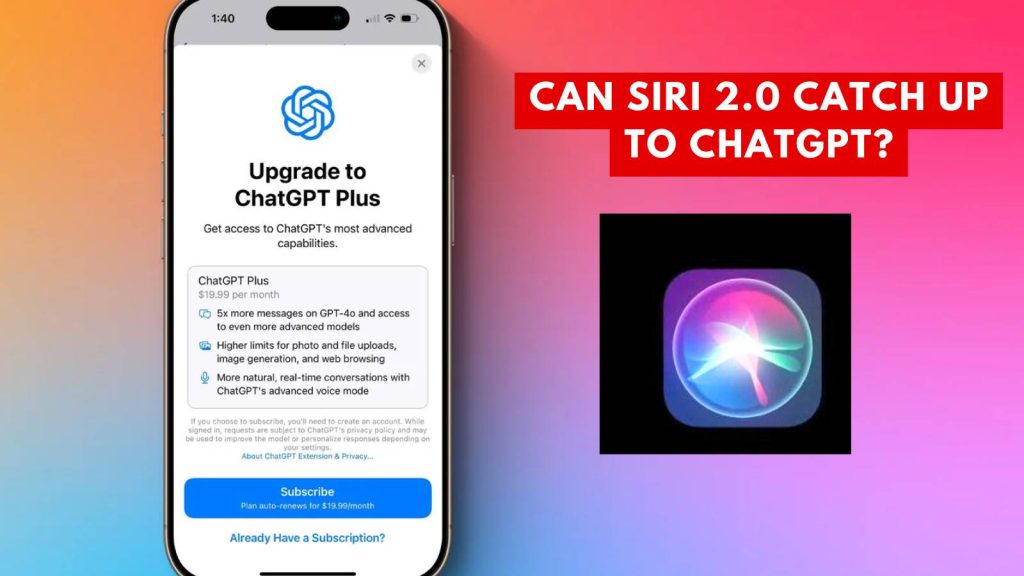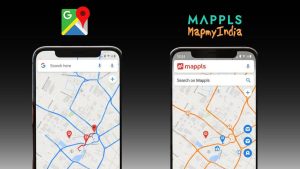The AI voice assistant landscape is evolving faster than ever. Apple’s Siri, once the undisputed leader, now finds itself facing strong competition from ChatGPT, which has redefined user expectations for AI interaction.
Users now expect voice assistants to provide nuanced, intelligent responses rather than merely executing simple commands. ChatGPT’s ability to understand complex queries, maintain context across multiple interactions, and generate creative outputs has set a new benchmark.
For Apple, the challenge is not just about upgrading Siri—it’s about redefining its role within the Apple ecosystem to deliver a seamless, intelligent, and intuitive experience that matches or surpasses ChatGPT’s versatility. The key question is: Can Siri 2.0 catch up to ChatGPT?
Apple’s Ambitious Siri 2.0 Plans
Apple has ambitious plans for Siri 2.0, which could transform it into a far more capable AI assistant. At the center of this transformation is “Veritas,” an internal AI prototype designed to test advanced conversational abilities. Veritas aims to give Siri the ability to understand multi-step queries, provide context-aware suggestions, and even anticipate user needs before they are explicitly stated.
Apple is also focusing on deep app integration, connecting Siri with apps like Mail, Calendar, and Messages in ways that ChatGPT currently cannot without third-party add-ons. For example, Siri could intelligently schedule meetings, draft emails based on context, and summarize messages—all while keeping sensitive data private.
Apple’s privacy-first approach, which processes most queries on-device, slows innovation compared to cloud-first AI platforms like ChatGPT. Balancing privacy and advanced AI capabilities remains a significant challenge, which is why Siri 2.0’s rollout has been slower than anticipated.
ChatGPT’s Current Dominance in AI Assistants
ChatGPT has quickly become the go-to AI assistant for many users due to its unparalleled conversational intelligence. It excels in:
- Context Retention: ChatGPT remembers previous queries in a conversation, making multi-step interactions smoother and more human-like.
- Broad Knowledge Base: With training on extensive datasets, ChatGPT can answer questions across virtually any domain—from programming to creative writing.
- Adaptability: ChatGPT handles technical, creative, and casual queries effortlessly, giving it an edge over traditional assistants.
- Accessibility: Being cloud-based, ChatGPT works on virtually any device, whether it’s a smartphone, tablet, or computer, with consistent performance.
In contrast, Siri 2.0’s intelligence is currently limited to Apple devices, and its ability to handle complex, multi-step queries is still in development.
While Siri excels at integration within the Apple ecosystem, it struggles to match ChatGPT’s versatility and adaptability in real-world applications.
Apple’s Internal Challenges: Delays and Concerns
Apple’s journey toward Siri 2.0 has been hampered by internal hurdles:
- Engineering Concerns: Some internal teams have flagged potential issues with AI accuracy, ethical implications, and user privacy. Ensuring that Siri provides reliable information without breaching privacy protocols is a complex challenge.
- Talent Retention: Apple has reportedly lost AI engineers to startups and competitors focused entirely on artificial intelligence, which has slowed innovation.
- Testing Protocols: Apple’s meticulous testing ensures high reliability but extends development timelines. Unlike ChatGPT, which can iterate rapidly with cloud-based updates, Apple’s device-focused model requires rigorous validation for each hardware generation.
These internal issues explain why Siri 2.0, despite its potential, remains behind ChatGPT in conversational sophistication.
Technical Limitations: Hardware and Software Constraints
A significant constraint for Siri 2.0 is hardware dependency. Advanced AI features require Apple’s latest chips, such as the A17 Pro, for on-device computation. Older devices cannot efficiently process advanced AI tasks, meaning that only a fraction of iPhone users will experience the full potential of Siri 2.0.
Siri’s privacy-first architecture limits cloud processing, which restricts the AI’s ability to access large datasets in real time. ChatGPT, in contrast, leverages the cloud to deliver answers instantly, without being bound by device capabilities. This gives ChatGPT a scalability and performance advantage that Siri struggles to match.
Siri’s software integration with third-party apps remains limited. While Apple encourages developers to work with SiriKit, the lack of universal app support hinders the assistant’s versatility.
User Experience Hurdles: Integration and Accessibility Issues
Even with improvements, Siri 2.0 faces challenges in user experience:
- Fragmented Experience: Advanced features are only available on newer devices, creating inconsistency across Apple’s user base.
- Limited Multi-Step Reasoning: Siri can still falter when handling multi-turn tasks, such as planning a day with multiple appointments, which ChatGPT performs seamlessly.
- Context Awareness: Maintaining conversation context is an area where Siri still lags behind. For example, if you ask Siri to “reschedule my meeting” after discussing a calendar event, it may not always recognize the context correctly.
- Voice Recognition Limitations: Siri’s speech recognition, while accurate, occasionally struggles with regional accents or ambiguous phrasing. ChatGPT’s text-based interface avoids this issue and allows richer interactions.
These challenges highlight that user expectations have grown beyond simple voice commands, and meeting them is crucial for Siri to compete effectively.
Apple’s Strategic Position: Playing Catch-Up in the AI Race
Apple’s approach to AI is methodical and privacy-focused, contrasting with competitors who prioritize rapid feature deployment:
- Privacy-First Philosophy: Apple processes most Siri requests on-device, reducing risk of data exposure but limiting computational power.
- Ecosystem Integration: Siri is deeply integrated across Apple devices, providing convenience that rivals cannot easily replicate.
- Incremental Innovation: Apple prefers gradual updates over rapid iterations, ensuring reliability but slowing progress relative to ChatGPT’s constant updates.
This strategy protects user trust but leaves Apple playing catch-up in the broader AI assistant landscape, particularly as cloud-based AI platforms continue to innovate aggressively.
Future Outlook: Can Siri 2.0 Compete with ChatGPT?
Siri 2.0 has potential but requires significant innovation to compete with ChatGPT:
- Cloud Collaboration: Apple may consider selective cloud-based enhancements to improve AI performance without compromising privacy.
- Multi-Step Reasoning and Context: Advanced algorithms are needed to allow Siri to handle complex, multi-turn tasks efficiently.
- App Ecosystem Expansion: Improved integration with third-party apps could make Siri a more versatile assistant.
- User Personalization: Learning user preferences over time without invading privacy could give Siri an edge over competitors.
While Siri may eventually narrow the gap, matching ChatGPT’s flexibility, adaptability, and cloud-powered intelligence will take years of development and strategic adjustments.
FAQs
1. What is Siri 2.0?
Siri 2.0 is Apple’s upgraded voice assistant with smarter, context-aware responses and the ability to handle multi-step tasks while maintaining privacy.
2. How does Siri 2.0 differ from ChatGPT?
Siri 2.0 is optimized for Apple devices and privacy, while ChatGPT is cloud-based, versatile, and excels in open-ended conversations.
3. Can Siri 2.0 handle complex queries like ChatGPT?
Not fully—Siri 2.0 is improving but still focuses on task-oriented requests, whereas ChatGPT handles multi-step and nuanced queries easily.
4. Is Siri 2.0 available on all devices?
No, advanced features require newer Apple devices with the latest processors; older devices get limited functionality.
5. How does Siri 2.0 protect user privacy?
Siri processes most requests on-device, minimizing data exposure, unlike cloud-based assistants such as ChatGPT.
6. Can Siri 2.0 access real-time information?
It has limited real-time access via Apple services, whereas ChatGPT can fetch and process dynamic online data more efficiently.
7. What improvements are coming to Siri 2.0?
Future updates include better context understanding, multi-step reasoning, predictive suggestions, and deeper app integration.
8. How does Apple’s AI strategy differ from OpenAI?
Apple focuses on privacy, ecosystem integration, and reliability, while OpenAI prioritizes cloud-based flexibility and broad AI capabilities.
9. Does hardware affect Siri 2.0 performance?
Yes, advanced Siri features require the latest chips; older devices may experience slower responses or limited functionality.
10. When will Siri 2.0 fully compete with ChatGPT?
Full parity will take time, with gradual updates expected over the next few years as Apple refines Siri’s AI capabilities.






